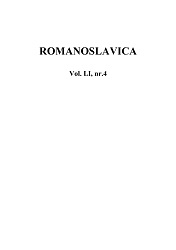Панаит Истрати. Нa Изток от Запада и на Запад от Изтока
Panait Istrati. East of the West and West of the East
Author(s): Ghergana NacevaSubject(s): Social history, Romanian Literature, Translation Studies, Politics of History/Memory
Published by: Editura Universităţii din Bucureşti
Keywords: Panait Istrati; totalitarianism; The Case Istrati; Balkan writer;
Summary/Abstract: The article is dedicated to the 80th anniversary of Panait Istrati’s death. It makes for a subject his publicist book “Confessions of a defeated”. The other flame or 16 months in the USSR”, translated in Bulgaria in 1930 and criminalized during the totalitarianism. The proposed text shows various discourses through which interpretation is trying to construct “The Case Istrati”, which caused a political scandal in Europe and Stalinist Russia. In the complex mixing between biographical and documentary is claimed a polyphonic narrative which echoes the voices of historical, political and intellectual figures of the past 20th century. The documentary layer collects many facts, statistics and polls, diary fragments, journalistic articles, analyzes and memories. This journalism weaves in a modern way plurality of opinions and points of view – these of the writers Nikos Kazantzakis, Victor Serge, Boris Suvarin, Helen Kazantzakis and the Istrati’s Bulgarian translator – Ognyan Stamboliev. It articulates the involvement crisis and the party affiliation, the reversals and reorientation in the opposition “left – right” and the role of the journalism which reformulates different ideological and political myths. Against the background of the era are situated iconic artistic minds from the East, as Maxim Gorky, and those from the West – Romain Rolland, Henri Barbusse, André Gide. All they, and their utopias and misconceptions associated with totalitarian projects, are a classic evidence of political commitment in the anxious 20th century. The study constructs the figure of Panait Istrati as a Balkan writer with certain specific attitudes, mentalities and reflexes. His figure demonstrates the genesis of the intellectual resistance and the anger of the disappointed artistic individual, who has become a spokesman for people forced to remain silent. The book “Confessions of a defeated…” is read through the prism of social and intellectual history, too. It is a testament to the silences and active involvement of the intellectuals in dialogue with the past through the eyes of the present.
Journal: Romanoslavica
- Issue Year: LI/2015
- Issue No: 4
- Page Range: 237-249
- Page Count: 13
- Language: Bulgarian

